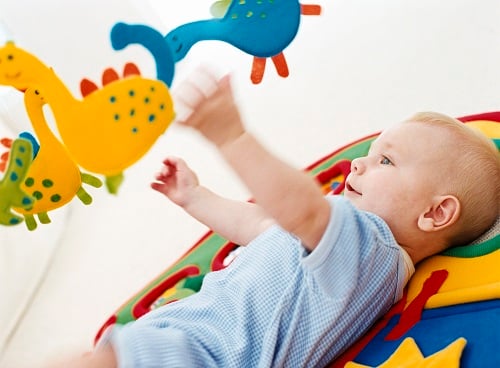Ever wondered why babies make the same sounds regardless of which country they are from? It’s almost like babies have their own universal language that adults don’t really understand!
Research has shown that baby talk is much more complex than we assume. Most parents do realize that their babies are trying to communicate something by making sounds. But it takes them at least 6 months to learn their baby’s cues. Even then, much of the baby language remains a mystery.
Language starts in the womb
Research done at the Pacific Lutheran University showed that babies learn language in utero. The tested newborns responded to words they previously heard while in the womb.
Babies develop their hearing before being born. So hearing their mother’s voice helps them develop language before birth.
They are particularly sensitive to vowels, which they are able to distinguish first among other sounds. Researchers also found that the last 10 weeks of pregnancy are key for learning language.
De-coding baby talk
Understanding baby talk would make life so much easier for parents especially since the needs of a small baby are sometimes hard to figure out.
But experts believe that babies they do more than just cry. They have a language of their own and if parents pay attention they can start to understand it. At least partially!
You can actually train yourself to understand the sounds your baby makes with the Dunstan Baby Language System.
According to the Dunstan Baby Language System, parents can learn how to decipher the sounds their infant makes. This system was founded by Priscilla Dunstan, who believes she has unlocked the secret to understanding newborn babies' cries. Thanks to her photographic memory for sound, Dunstan was able to hear the differences between the sounds of infant cries and unlock the meaning behind them.
According to this system, here is what the various sounds your baby makes mean:
Neh= “I’m hungry”
Owh= “I’m sleepy”
Heh= “I’m experiencing discomfort”
Eair= “I have lower gas/ I need to poop”
Eh= “I need to burp”
Priscilla Dunstan says these sounds are actually reflexes that all babies have and that parents can learn to identify these sounds before the baby starts to cry.
While it may take some time to identify the sounds your little one makes in this manner, if and once you do, those times when you struggle to decipher what your baby is crying about will most certainly be minimised. In turn, this means happy baby and happy mummy!
References
http://www.babyzone.com/baby/crying-and-soothing/decode-baby-cries_85995
http://www.sheknows.com/parenting/articles/952759/cracking-the-code-the-secret-language-of-babies
Last Published* April, 2023
*Please note that the published date may not be the same as the date that the content was created and that information above may have changed since.




